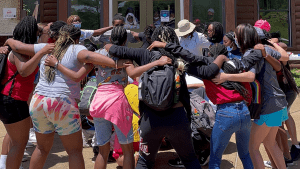by Nicki Thomson, PhD
Senior Director, Research and Learning
Background
In collaboration with Dr. Florian Sichling at UMSL, Wyman received funding from Missouri Scholarship & Loan Foundation (MSLF) and Wyman’s Saigh Foundation Endowment Fund to explore our existing partnerships with five higher education institutions: Missouri State University (MSU), Southeast Missouri State University (SEMO), St. Louis University (SLU), University of Missouri-St. Louis (UMSL), and the University of Central Missouri (UCM). The overall aim was to deepen our understanding of effective practices within these partnerships — the collaborative practices and supports that lead to postsecondary success for young people. This information is intended to be used for our internal learning and improvement efforts, and to share with other organizations doing similar work.
Interviews
- Eighteen Wyman Leaders participants: 6 from MSU, 5 from UMSL, 4 from SEMO, 2 from UCM and 1 from SLU[1] were interviewed. Questions focused on their program experience, how program prepared them for postsecondary, challenges in their postsecondary journeys, supports from Wyman and from their universities, and plans for their future.
- Seven current or former staff from 4 of the 5 partner schools (not including UCM), and 5 current or former Wyman staff were interviewed. Questions focused on their professional backgrounds/roles in the partnership, how the partnership is implemented on a day-to-day basis, supports offered to students, and how the partnership could be improved.

Findings
Themes from Staff Interviews: Importance of Relationships
Strong relationships are a key driver of the strength and quality of a partnership and the ability of students to access the resources and benefits. Staff relationships are the foundation for:
- Ongoing, timely information exchange that can serve as an early warning system about student needs before they escalate to more serious challenges, e.g., need for mental health counseling or academic tutoring.
- Mutual active tracking and monitoring of student progress.
- Mutual reinforcement of expectations, e.g., consistent messages about what students should be doing to be successful.
- Establishing clear points of contact and channels of communication across organizations.
- Buffering challenges when there is staff turnover. Staff turnover is a major challenge for maintaining trusting relationships. Relationship maintenance from leadership to staff working directly with students is critical.
Staff-student relationships are also important. Intentional strategies like outreach before students arrive on campus or peer mentoring should be considered. Staff-student relationships are the foundation for:
- Conveying trust. Wyman’s “stamp of approval” helps students build trust with higher ed partner staff.
- Students seeking timely help and support in moments of challenge or crisis.
Supporting the development of a sense of belonging, particularly critical for students of color attending a predominantly white institution.

Themes from Student Interviews: Partnerships as Sources of Support
Students highlighted the importance of the supports offered through partnership universities for helping them with academics and persisting through challenges. Students highlighted the importance of:
- Two levels of support: a Wyman coach and a campus advisor: “one person here, one person away”.
- Extra support they receive especially during challenges—COVID providing a clear example of the critical emotional support students received from Wyman and from their campus advisor.
- Institutional connections. Wyman helping to make the connection to the campus advisor made the college transition easier.
Overall, students expressed their deep appreciation for being embedded in two complimentary sets of support systems through these partnerships. Student interviews reinforced staff interview themes around the importance of staff continuity and strong communication for shaping the effectiveness of the partnership and the supports they received. Students of color expressed the challenges they experienced attending universities with less diversity in non-urban settings, an area for additional attention and intentional support strategies.

Key Takeaways and Next Steps
Three main takeaways—important components of effective Wyman-higher ed partnerships:
- Maintaining strong staff relationships at multiple levels in each organization so that written agreements are implemented as intended and that students continue to receive supports through staff transitions.
- Close monitoring of student experience and needs, and regular exchange of this information between Wyman and partners, to ensure timely provision of support to students.
- Building trust between students and staff and attending to students’ sense of belonging is critical to their success and should begin prior to students arriving on campus. Implementing strategies to foster a sense of belonging is particularly important for students of color attending a predominantly white institution.
Many staff described the increasingly critical role of financial aid for higher education access and persistence, and that direct scholarship aid is ever important within the context of college affordability challenges. With a second round of funding from MSLF, we will explore Wyman’s scholarship partnerships and how these funding opportunities impact Wyman Leader’s postsecondary decisions and success.

[1] SLU student was not enrolled in the College of Education, the focus of the Wyman partnership.




